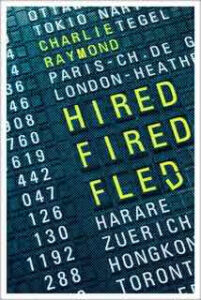If you think fiction authors have it tough trying to break through into trade publishing, it's even harder for non-fiction authors who don't have a high-profile public platform – like being an actor in Downton Abbey, as one agent told indie author Charlie Raymond, who went on to self-publish his memoir of finding himself after a checkered and eventual career that took him around the world, Hired, Fired, Fled. Charlie explains why he put himself through the process of seeking an agent anyway, and what he learned from it.
“If you’re going to do something, do it properly.”
It’s a motto that’s guided my foray into publishing, leading me to contact every single literary agent in London representing non-fiction, applying to around 90 agents, all of whom rejected me, 40 or so directly, with the others not replying to emails.
Now, here’s where it gets interesting. Of the 40 who actually got back to me:
- 20 of those emails were generic rejections, without any reference to the book
- 10 were semi-generic rejections, as in they named the book and gave a generic reason as to why they couldn’t take it on, such as “I’m slammed with books”;
- 5 were semi-semi-generic, giving slightly more clarity as to the reason for their rejection, e.g. “if it were 10 years ago, maybe, but the market’s too tough now”
- 5 were semi-specific, mentioning the book, saying they’d read a few pages, saying whether they liked it, and telling me why it wouldn’t be possible to sell it into publishing firms
That’s a lot of rejection.
No Surprises in Agents' Rejections
It’s also not a big surprise, and that’s because my book is a non-fiction career meltdown meets travel adventure about finding your path in life. It focuses on an unknown author undertaking 14 jobs in 15 years across 4 continents.
It’s an unusual story, but that’s not enough for agents. What they want to see for non-fiction writing is a platform.
Of those semi-specific replies:
- one agent told me that if I had just 5,000 Twitter followers I’d have a platform
- another said that if I had a blog followed by hundreds I’d have a platform
- another said that, fairly obviously, if I were a Downton Abbey actor, I’d have a great platform: i.e. they need to be able to take your name to a publisher and tell them that the book won’t be a problem to sell
None of this rejection made me bat an eyelid.
I knew the self-pub route was for me, as I’d already researched enough to know that top-selling non-fiction books are mostly made up of autobiographies ghost-written for actors and politicians.
It’s rare for a book like Eat, Pray, Love – about a relatively unknown author’s journey across the globe – to sell over 10 million copies. That’s partly because Elizabeth Gilbert’s story connected with the demographic that buys the most books: women over the age of 40.
And that brings me to my next point: I already knew this. I knew that my book about career misadventure, with stories such as being falsely accused of sleeping with the boss’s wife whilst working on a safari park at the age of 19, likely wouldn’t connect with that key demographic, but I wanted to write it anyway.
And so, without a platform, or a story that would immediately connect with the biggest book-buying demographic, finding a publisher was as likely as snow in the Sahara. But, even so, I wanted to try. “If you’re going to something, do it properly.”
Doing It Properly?
So I wrote personal emails to those 90-odd agents, taking several days to ping them out, already in the knowledge it was probably a fool’s errand, but willing to do it anyway, because imagine – just imagine – if one of them had come back and shown interest…
That said, even if they had shown interest, I’d probably have still ended up self-publishing, as I’d also read tales of people getting publishing deals, then being left with pennies after the agent and publisher took the lion’s share of any profits. On that note, I had one agent tell me that if I did get anywhere with self-publishing, as in over 10,000 sales, I should call him, as he’d then be able to show something to publishers.
I politely thanked him… and deleted his email.
OVER TO YOU Did you/would you follow Charlie's traditional route, or go straight to the self-publishing route? How did you get on? We'd love to hear your stories too – please feel free to leave comments!
Calling #nonfiction authors for a must-read post about why agents are reluctant to sign you up - by @hiredfiredfled Share on XIf you liked this post, you may also enjoy this one about self-publishing non-fiction:







[…] Opinion: Why It’s Even Harder to Find an Agent for A Non-Fiction Book – and Why I’… […]
Yes, very interesting post. I self published my nonfiction book four years ago without approaching an agent as I knew it was a niche subject (family history in early colonial Australia), and it’s been selling modestly but steadily ever since. A friend published her memoir traditionally and while it got quite a lot of press coverage including a full page piece in the Guardian and sold moderately well she has yet to earn her advance. Plus us indie authors are far more likely to get out there and give our stuttering motors a but of a push when they seem to be stalling. Good luck with your memoir, if sounds intriguing.
It’s yet another story of a ‘signed author’ waiting to see significant – or any – returns. Yes, self-pub authors can/should get out and push the motor themselves – love the metaphor.
Good luck to you too. Keep pushing!
I learned a lot from querying agents. Most rejections were forms, of course, but some were real feedback after having read my book (it was a novel). A few of the comments even led me to rewrite and revise. I feel my novel grew significantly better as a result. Now I have a (v small) publisher for this same novel–found without agent–and couldn’t be happier.
In a way, agent querying is a way to get free professional feedback on your book……
Fully agreed that the limited ‘specific feedback’ that does return to your inbox from agents is interesting to see, and potentially useful.
I’d definitely agree that it’s worth a shot – if you have the time, give it a go (and a thick skin)!
Those of us self-pub’ing nonfiction need more posts like this. It IS possible to do this successfully. Agents are about big numbers (or else they can’t make a living). Authors are about connecting with their individual audience, and I don’t need millions (well, it’d be nice!) to be successful. So good for you, and may you enjoy success (however you define that!).
I’m having more success now with my re-energized/released backlist and new titles than I ever did with the declining returns with my New York publishers (and brilliant agent). Loving the freedom here. *s*
Really grateful for this sobering cautionary advice. As I have just started on a memoir it applies. As to a platform I have knocked a couple of planks together but they take little weight, so I must just accept the need to find a way to stabilise and still keep writing. I find the two cut across one another and render me scriptless.
I was about to be tempted down the ‘find an agent path’ and this article has put up the road closed signage.
Never say never though… as the comment from KSR Burns notes, it is interesting to see feedback, and it might be useful, so if you have the time, maybe give it a go… but it does take time, and it can be rather painful 🙁
I have self-published six small nonfiction books. Originally, they were all one book and I pitched it to 48 agents. About half responded, mostly generic, but those who personalized it all said the same thing: “I don’t know how to market it.” I appreciated the honesty, but was baffled by it. When I decided to break it into a series, I self-published it, knowing no one would touch it then.
That decision was 4 years ago. I have a small, loyal following, nowhere near the numbers you quoted. I’m researching a new book now that builds a bit on one of the books in the series, but is rooted in a community I came back to after many years (AIDS).
My platform is not about numbers. My platform is about the credibility I have in the AIDS community (not top-tier but not unknown). It’s built on the people from the US and UK who have already pledged their support to the project (some of them celebrities). It’s built on the excitement in the community in general for this book.
I pitched the book to 5 agents at Writers Digest in August, one of whom has been interested in it since I asked him for general feedback a year ago. All asked about platform – not numbers, but more specifically, “what can you deliver?” They asked who would write the foreward for the book, as well as blurbs. I told them I’d written freelance articles about the topic, added its own Facebook page and Pinterest boards, and was about to start making presentations. I told them two bookstores have already committed to book launches, and that a magazine had contacted me wanting to know when they could print an excerpt.
Everything I said was well-received. I never talked numbers, and they never brought it up (except to ask about website hits). They wanted to know if I understood my target market(s) and whether I was capable of reaching them. I do and I am.
But I’ve made it clear to everyone that I will self-publish without an agent if need be. This book has taken on a life of its own, even though I haven’t started writing it yet. As soon as I can put together a sample chapter, the proposal will be sent out.
Worst case scenario: I don’t get an agent. But the proposal has given me an excuse for putting my marketing plan in writing. And the book will go forward regardless.